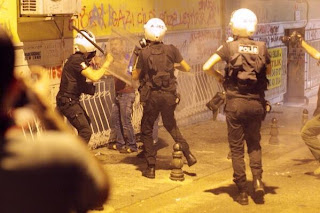…on the
twenty-fifth of December. While perhaps it is still early to make such a
bombastic statement, however there is no doubt that what we saw on this day is an
historic turning point. For the first time, Turkish citizens and analysts alike
are starting to imagine a Turkey without the Turkish Prime Minister, Recep
Tayyip Erdogan.
The arrests on
December 17 (see
former blog) have thrown Turkey into a state of chaos, culminating in the
resignation of three government Ministers on December 25. The first two resigning ministers have sons under arrest, linked to the probe; the powerful Interior
Minister, M. Guler, and the Minister of Economic Affairs, Z. Caglayan, who is
also accused of receiving a $350,000 watch as bribe. However, it was the resignation
of Environment Minister, E. Bayraktar, that set off a massive political
earthquake. Bayraktar, angry at the allegations and for being pressured to
resign, called upon Erdogan to resign, stating
that “because a big part of the zoning plans that are in the investigation file
and were confirmed were made with approval from Mr. Prime Minister.”
 |
| Pro-goverment paper blames US, Israel, and Gulen group |
Just hours after
the resignations came the second political earthquake: news came in that a “Second
Wave” arrests was about to take place. However, no time at all passed before
rumors spread throughout the media and twitter waves that the police were
refusing to carry out the prosecutor’s orders, which included the detainment
of Erdogan’s son, Bilal, along with a whole list of key business figures.
The next day,
late in the afternoon, news broke that the prosecutor of the “Second Wave,” had
been removed from the case. According to the prosecutor, M.
Akkas, “I learned that I was removed from my duty without any
justification, while the search warrants, seizure [of materials] and arrest
orders [were also taken from me]. The responsibility from now on falls with the
Istanbul public prosecutor and his deputy. All of the public and my colleagues
should know that my task as a prosecutor has been obstructed…”
 |
| Liberal Taraf paper claims "Second Wave" probe deals with 100 billion dollars |
In the meantime, Erdogan, who just appointed a new cabinet in a "reshuffle" (a move planned ahead of
probe in preparation of the March local elections and post-budget approval) has
opted to stand strong against all accusations of corruption, blaming it on international
conspiracy. Further, he even went so far to praise the main suspect of the “First
Wave” of the corruption probe, Reza Zarrab,
and is standing by the CEO of Halkank, who was allegedly found with shoe
boxes of dollars stashed away in his home. In Erdogan’s words,“Zarrab exports
gold and I know that he is involved in charity activities as well.” In others,
if some thought he would throw Zarrab and his accused accomplices “under the
bus,” at least for now that is far from the case.
In my last blog,
I asked how long will AKP MPs be willing to put up with this circus; one major
MP already resigned on December 25 (following the resignation of the ministers),
Idris Naim Sahin; another MP, hinted to widespread corruption while handing
over his post to the newly appointed minister after Erdogan relieved him from
his position as minister in the “reshuffle.” Lastly, one AKP MP criticized the
PM for appointing an Interior Minister who is not a MP. However, the fact that there is a stirring within the party, does not mean that we are anywhere near a group
of AKP MPs abandoning Erdogan, in order to set up a new party within the
parliament.
Nevertheless, if
the state of affairs continue to deteriorate at the speed it has been during
the last few days, it seems hard to imagine that his party members will remain
silent. In the event they do not take matters into their hands, then Erdogan
will need to face a growing chorus of opposition calling for his resignation,
or at least, early elections, among the Turkish population at large. For now, however, the ball is still in Erdogan's court, and he very well could come out on top if he plays his cards right.














